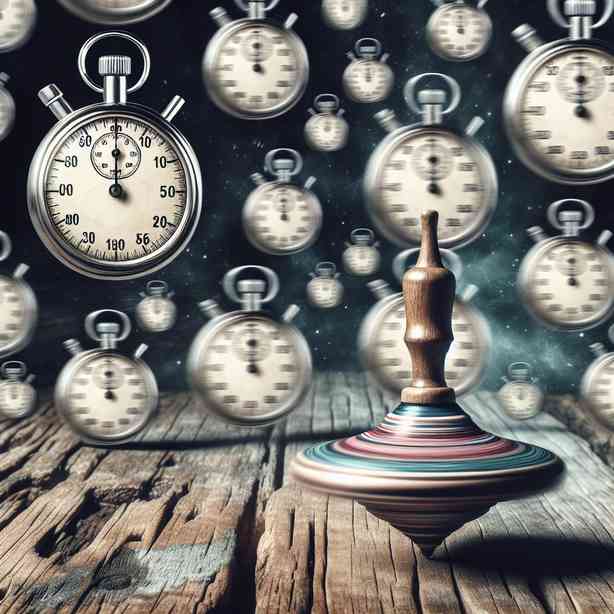
Understanding the concept of time perception can be quite intriguing, especially when considering situations where every spin feels slower than the last. This feeling is often experienced in various contexts, from thrilling amusement park rides to moments of heightened anticipation or anxiety. Why does time seem to stretch in such scenarios, and what are the psychological and physiological mechanisms behind it? In this discussion, we will explore the factors that influence our perception of time, delving into the complexities of human cognition, emotional states, and the role of memory.
Time perception is a fascinating aspect of human experience. It is not merely a straightforward measurement of seconds, minutes, or hours. Instead, it is influenced by a myriad of factors, including attention, emotional state, and even the culture in which one is immersed. When we find ourselves in an exhilarating situation, such as on a roller coaster or during a competitive event, our brains become intensely focused on the present moment. This hyper-focus can make seconds feel longer than they actually are, effectively stretching our experience of time.
The phenomenon can be partly explained by the brain’s processing speed. When we encounter something new or thrilling, our brains take in a multitude of details. This heightened awareness leads us to form more memories of the event. The more memories we create, the longer that experience feels in retrospect. Consequently, when recalling such moments, it may seem like we have spent much more time than we actually did in that scenario.
Another contributing factor is the release of neurotransmitters during moments of excitement or fear. When we face thrilling experiences, chemicals such as adrenaline and dopamine flood our systems. These hormones trigger a state of heightened alertness, enhancing our awareness of our surroundings and the passage of time. While this can make these moments feel prolonged, it can also lead to a disassociation with the usual, more mundane progression of time.
Conversely, mundane tasks often feel to pass quickly. A day spent doing routine chores can feel like it flies by, especially when one is not particularly engaged or excited. The brain processes fewer new memories during these periods, which makes recollections of the day short and less impactful. The less significant the memories associated with those moments, the fewer markers there are for our mind to associate with that passage of time.
Moreover, the impact of our emotional states on time perception cannot be understated. When we are anxious or fearful, time may seem to slow down. This phenomenon is often described in literature and anecdotal accounts where individuals report that during traumatic events, time appears to stretch infinitely. This can be somewhat distressing, as it can lead to an overactive mind racing through countless thoughts, causing each moment to feel extended and painful.
On the other hand, when we are in a state of happiness or joy, we generally experience time as moving more quickly. This duality highlights the significant role that our emotional states play in how we perceive the passage of time. Understanding the connection between emotion and time perception can be both enlightening and therapeutic. By becoming aware of how our feelings impact our perception, we can learn to navigate our experiences more mindfully.
It is also essential to consider the cultural aspects of time perception. Different cultures may have varying attitudes towards time, which can influence how individuals perceive its passage. In cultures that value punctuality and efficiency, people may feel pressured to adhere to strict time frames, leading to a faster perception of time. In contrast, cultures that prioritize relationships and experiences over strict schedules might foster a more relaxed view of time, allowing for a slower, more enriched experience of the present moment.
To further explore how our memory impacts time perception, consider the concept of time dilation in psychology. This concept suggests that as we age, our perception of time seems to accelerate. Researchers propose that this may stem from a decrease in the number of new experiences as we get older. Childhood is often rich with novel experiences—first days of school, new friends, and major life events. In contrast, adulthood can become routine, leading us to feel that time is slipping away more quickly.
Additionally, engaging in new activities and experiences can help combat this speeding perception. For instance, trying new hobbies, exploring unfamiliar places, or learning new skills can enhance our time perception by creating new memories. The more unique experiences we have, the more markers we create in our minds, making the time feel more substantial.
In summary, the feeling that every spin feels slower than the last is a complex interplay of various factors, including heightened awareness, emotional states, memory formation, and cultural influences. Our perception of time is not that of a mere linear progression. Instead, it is a rich tapestry woven together by our experiences, emotions, and the fundamental ways we connect with the world around us. Understanding this can empower us to make conscious choices about how we spend our time, embrace new experiences, and cultivate a deeper appreciation for the moments that define our lives. By recognizing the fluid nature of time and our perception of it, we can enrich our lives and find joy in the present, even when every spin feels slower than the last.


